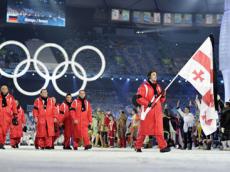|
|
TODAY.AZ / Analytics
Georgia's “soft power” in relations with Russia
06 February 2014 [16:18] - TODAY.AZ
 By AzerNews
By AzerNewsGeorgia has taken quite an 'uneasy decision' decision to join Sochi Winter Olympics Games, which will be held in Russia on February 7-23.
Protests have been made at Georgia's participation at the Olympics in Russia, which controls over Georgia's two rebel regions - South Ossetia and Abkhazia since August 2008.
"Georgia made the decision in favor of national sport," Prime Minister Irakli Garibashvili said while addressing the Georgian sportsmen on February 5.
"Participation in the Sochi Olympics evokes a special emotion for us, as the games are held at the Georgian-Russian border, near the occupied Abkhazia," he said. "It was quite difficult to decide on participation in the Olympics, but we took into account various factors and made ??the decision in favor of Georgian sport, our athletes and the public interests."
NATO and the European Union welcomed Georgia's "right step" to restore relations with Russia, noting that sport has always been an opportunity to go beyond politics.
Can the "cold games" warm the Georgian-Russian relations and enable Tbilisi to restore ties with Moscow amid its NATO and EU aspirations?
Georgian political expert Gela Vasadze believes that Tbilisi uses "soft power" tactics for the normalization of relations with Moscow.
"A topic of occupied territory is kept beyond the economic and humanitarian relations between Georgia and Russia. There is a thesis that sport, culture and the economy should go beyond politics and this works," Vasadze told AzerNews.
He said quite strong Russian lobby has appeared in Georgia's power after the parliamentary elections on October 2013.
"Saakasvhili's government did everything to minimize its dependence on Russia, but the current government does exactly the opposite. Georgia has distracted from the Russian orbit so far over the last ten years that it will be extremely difficult to bring it back," Vasadze noted.
He believes that Moscow almost lacks leverages to pressure on Georgia.
"The Kremlin will hardly do anything to prevent Georgia to become the EU's associative member until August 2014, when Tbilisi will sign the agreement with the EU," Vasadze said.
Russian political expert Aleksey Vlasov believes that positive changes in Georgian-Russian relations are inevitable.
"The changes will not be so intensive, the sides will bring the positions closer step by step," Vlasov told AzerNews.
He said first of all relations in business, trade and tourism have warmed. "Political rapprochement is hardly possible in the short term. Moscow, and probably Tbilisi, well understand this," Vlasov noted.
URL: http://www.today.az/news/analytics/130661.html
 Print version
Print version
Views: 2372
Connect with us. Get latest news and updates.
See Also
- 23 November 2024 [13:22]
"The New York Times" wrote about Azerbaijan's Naftalan and how... - 17 November 2024 [09:00]
Frank Schwabe steps up his rhetoric around COP29 as he finds it unreachable - 15 November 2024 [20:25]
Pashinyan's allegation augurs Armenia's deviation from peace talks - 15 November 2024 [17:02]
US Department of Labor pushes for worker-centered just transition at COP29 [COMMENTARY] - 14 November 2024 [20:55]
Azerbaijan’s COP29 presidency sets precedent with focus on amplifying voices of vulnerable nations - 08 November 2024 [18:57]
Liberation of Shusha: Intersection of History and Strategy - 07 November 2024 [20:45]
From press to politics or sympathy to hatred: Gallup's downbeat survey on Pashinyan's rating - 01 November 2024 [11:05]
Sustainable development is one of goals of COP29 - 31 October 2024 [13:50]
New trains, green lanes: Azerbaijan's journey to COP29 readiness - 28 October 2024 [17:10]
Lukewarm wishes from Yerevan - How sincere is Pashinyan in congratulating his Georgian counterpart?
Most Popular
 Armenians promise to get Woodrow Wilson's ideas out of the coffin
Armenians promise to get Woodrow Wilson's ideas out of the coffin
 Azerbaijan's peace initiatives: their importance is priceless
Azerbaijan's peace initiatives: their importance is priceless
 Aircraft carrier George Washington arrives in Japan for permanent deployment
Aircraft carrier George Washington arrives in Japan for permanent deployment
 Crushing blow from Baku to pro-Armenian Frank Pallone
Crushing blow from Baku to pro-Armenian Frank Pallone
 US climate experts brainstorm on multiple issues causing natural phenomena
US climate experts brainstorm on multiple issues causing natural phenomena
 Romania can becomes full member of Schengen area from January 1, 2025
Romania can becomes full member of Schengen area from January 1, 2025
 Renowned dancer Farid Kazakov joins jury of Istanbul Autumn Festival
Renowned dancer Farid Kazakov joins jury of Istanbul Autumn Festival
